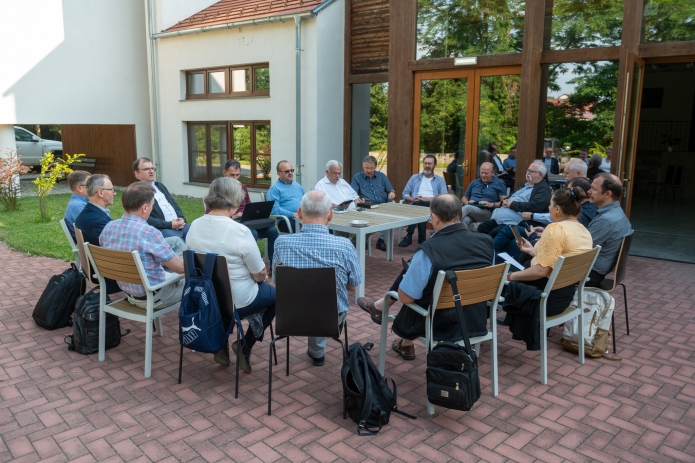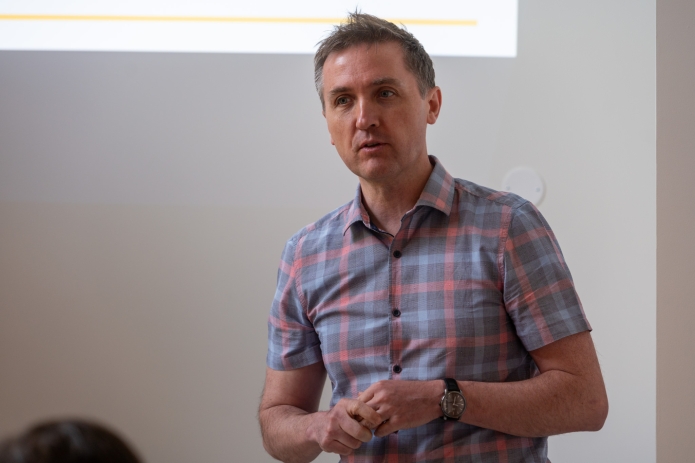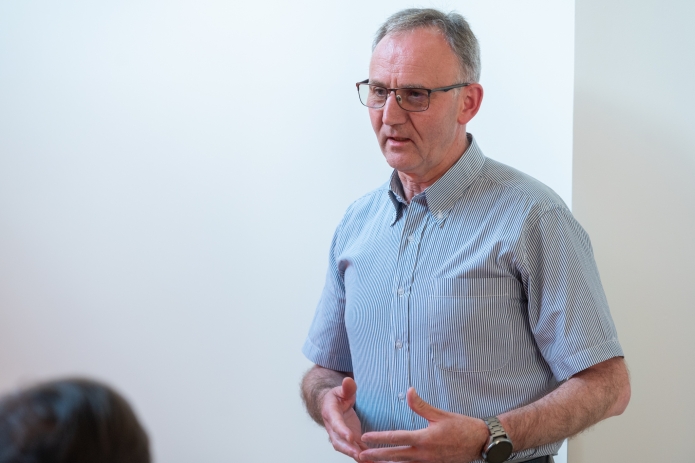On July 9-10, 2023, the teachers of the Protestant Theological Institute and the Reformed Church Districts of Transylvania and Királyhágómellék had their joint meeting for the fourth time.
Ilieni 2023. Evaluating the present and future of the Protestant Theological Institute



On July 9-10, 2023, the teachers of the Protestant Theological Institute of Cluj-Napoca (Kolozsvári Protestáns Teológiai Intézet) and the Reformed Church Districts of Transylvania and Királyhágómellék (Erdélyi- és Királyhágómelléki Református Egyházkerületek) had their joint meeting for the fourth time since 2016. The regular meeting aimed to evaluate the work at the Theological Institute in collaboration with the leaders of the Reformed churches responsible for running the institute, and to develop common plans for future cooperation between the PTI and the sponsoring churches.
From the RCDT (Reformed Church Districts of Transylvania) side, Bishop Béla Kató, Chief Secretary Vilmos József Kolumbán, General Director László Szegedi, Chief Steward Attila Ambrus, and Chancellor Sándor Gáll participated. From the RCDK (Reformed Church District of Királyhágómellék) side, Bishop Szabolcs Bogdán was present at the meeting. The PTI faculty members who participated were Zoltán Adorjáni, Csaba Balogh, Dezső Buzogány, Éva Éles, Levente Horváth, Dezső Kállay, Jenő Kiss, Sándor Előd Ősz, György Papp, Edit Somfalvi, József Székely, and Sándor Béla Visky.
During the 2023 meeting, eight topics were discussed. On the first day of the meeting, Vice Rector Csaba Balogh analyzed the admission data for the past five years (2019-2023). He highlighted that the 2021 pandemic significantly influenced the number of applications. However, there was a mild increase in the number of applicants in 2022 and 2023. He also pointed out that there was no significant over-application from female applicants compared to previous years. Notably, the proportion of applicants from the RCDH has been increasing in recent years. The data also revealed a continuous decline in the number of students from Reformed high schools applying to the Theology Institute. Previously, approximately half of the applicants came from church-affiliated institutions in 2019-2020, whereas in 2021, during the pandemic year, about 2/3 of the applicants came from church-affiliated institutions. However, this number decreased to 1/3 in 2023. Additionally, it was observed that the number of sending institutions became more fragmented. More students came from institutions that were not typical sources of applicants to the Theology Institute. This raises the question of whether it would be worth extending the promotional program of the Institute to high schools that were not considered before. (A detailed analysis of the admission data can be found in the attached PDF document or at this link: here.)
On the second day of the meeting, the evaluation of the institution's promotional activities during the last academic year was discussed. In 2022-2023, five events of this kind were organized. On May 23, 2022, a promotional program was presented to the Reformed College of Satu Mare by coordinating teacher Szabolcs Ferencz Kató and theology students Réka Kánya and Titus Pop. On August 1 and 4, 2022, two youth camps featured presentations about the PTI. On October 8, 2022, the caravan visited the Reformed College of Székelyudvarhely (Odorheiu Secuiesc), led by Szabolcs Kató and accompanied by István Telegdi, Norbert Jónás, Orsolya Páll, and Beatrix Bíró. On February 17, 2023, the Theological Institute opened its doors to high school students interested in applying. 44 high school students visited the Institute in Cluj-Napoca on the open day. The planned summer camp in Zetea Valley was canceled this year due to lack of interest. During the discussions, it was emphasized that the promotional program must continue. Besides open days and school visits, youth camps and retreats play a crucial role, as they can engage multiple interested young people simultaneously in a different environment than the school setting.
Another recurring topic during the meeting at Illyefalva (Ilieni) was the continuous evaluation of the practical character of the training, with a particular focus on the internship program. The mentoring program of the six-year students, launched in 2017, is one of the joint plans between the church districts and the Theological Institute. A new development in 2022-2023 was the inclusion of the summer period in the mentoring program. Students received an additional four weeks of practical training under the supervision of mentor pastors at various local churches to deepen their practical knowledge. In the last academic year, students from the final year completed 1235 active professional internship assignments. Despite the integration of the summer period, the completion of the required casual services is still not optimal. However, the extended timeframe allows students more opportunities to engage in youth work, which is mainly concentrated during the summer. It was suggested to use the extended time, which often involves administrative tasks, more effectively. Additionally, the varying degrees of involvement of interns remain a problem. Some complete few, while others undertake many internship assignments. It was agreed that determining the optimal number of internships is necessary. The details of the internship will be subject to detailed analysis during the autumn meeting with the mentors.
The internship program also requires revision in another aspect. The experience gained in the last seven years of the mentoring program shows that interns do not face all the practical tasks in the local congregations that are intended to be taught as part of the program. Therefore, discussions have begun on involving pastors (mentors) in the program who would hold joint training sessions on specific incomplete tasks (e.g., adult Bible study, youth missions, church-building) in addition to the individual church-based internships. This approach would allow students to gain sufficient qualifications in areas where their practical experience within a congregation might be incomplete. The need to consider starting the mentoring program before the sixth year was also discussed.
The fifth point of the meeting was focused on continuing education for ministers. Since 2017, the PTI has been offering two extensive training programs annually for Reformed ministers, following consultations with the church districts. While there is demand for the joint program organized by the PTI, not every teacher is ready to participate in it, resulting in the need to continuously shorten it. Moreover, the feedback often highlights that the training program lacks coherence. Considering the current different personal research areas, it seems that a higher amount of programs cannot be prepared by the PTI. The coordination of presentations requires much more time and flexibility from the lecturers. The preparation of a new presentation may require up to 100 hours, which means that teachers are inclined to adapt existing publications and research results to a specific theme rather than preparing new material specifically tailored to the topic. It was suggested that, in addition to traditional lectures, another form of further training should be introduced. During previous assistant pastor training sessions, activities focusing on supervising pastoral work received extremely positive feedback. These sessions did not consist of lectures but involved participants presenting case studies related to their work in the congregation (e.g., casual sermons, pastoral care records, religion classes, etc.), which were then evaluated by a coordinator and a group of participants. Such activities were beneficial not only for assistant ministers but also for those who have been serving for a long time and would appreciate participating in a coordinated, professional discussion of their pastoral work. There is demand for this type of activity, and it could be extended to other contexts beyond assistant pastor training.
The seventh point of the meeting was about expanding the educational offerings of the PTI. Traditionally, the Theological Institute only trains congregational pastors. However, the question arises whether this configuration should be maintained or if new paths should be explored in terms of educational offerings. The focus here is primarily on "assisting professions", short training programs that are closely related to the work of ministers and allow for specialization or training of church workers. The discussed specializations were family counseling, addictology and youth mission. In these areas, the church could cover fields that are essential to its mission and address current and acute societal needs (e.g., increasing family issues, growing substance abuse, youth and church dissonance). Some of these training programs already function as adult education to some extent, but transforming them into university-level education could improve their professional level and deepen the training. The church leaders expressed their support for this idea in principle, but further detailed planning of the programs is necessary.
The eighth point of the meeting was presented by Dean Jenő Kiss, who shared the results of a survey conducted among students. The survey revealed that the expectations of theological subjects exceeded the available resources. In other words, the high demands placed on students' learning and the constraints on their time need to be better aligned. Setting the bar too high can be demotivating for students. Furthermore, only a fraction of the invested effort remains retained, affecting the effectiveness of education. As the reorganization of education is planned for the future, particular attention must be paid to these pedagogical aspects.
The meeting in 2023 took place in a good atmosphere and extended into the second significant event, the joint institutional meeting of the Coetus Theologorum held in Illyefalva.
The PTI faculty members extend their gratitude to the Reformed Church Districts of Transylvania for their hospitality and openness in discussing shared matters.
[The photographs related to the event were taken by Gábor Kiss.]